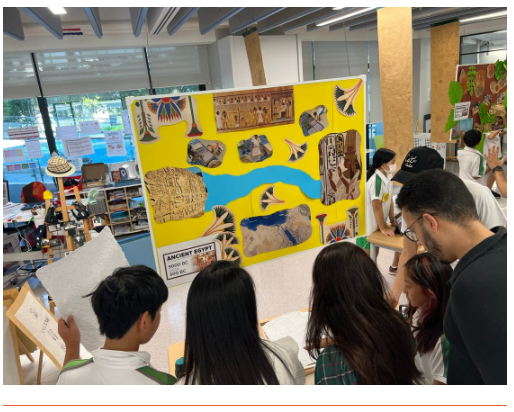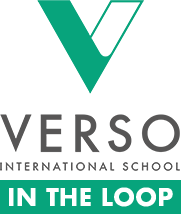ML Muster: Update on your child's Q2 360 Progress Report
VERSO 360s, Communication and Tech Safeguarding: In this Together!
Next Friday 2 February, families will be receiving their child's VERSO 360 Progress Report for Quarter 2. These will be emailed to the parents' VERSO email accounts.
Engaging in a shared review of a child's progress report is a valuable practice for parents, as it fosters an environment of collaborative understanding and support in the educational journey. This interaction is not merely about assessing academic performance; it serves as a vital bridge between the child's school life and home environment. By discussing the progress report together, parents can gain insight into their child’s learning experiences, strengths, and areas needing improvement. It allows for a deeper understanding of the child's academic and social development, offering a holistic view that goes beyond mere grades.
This process also empowers the child, giving them a voice in their educational narrative. It encourages open communication, helping the child to articulate their experiences, challenges, and aspirations. This experience demonstrates to the child that their educational journey is a shared priority, enhancing their motivation and engagement in learning. This practice aligns well with the ethos of progressive education, which values the development of the whole child within a supportive and understanding community. In essence, reading a progress report together is not just about academic assessment; it's about building a partnership in learning and fostering a supportive family environment that values education and personal growth. Please reach out to your child's Community Time Learning Designer if you have any questions regarding your child's VERSO 360.
5-6 | ShowTime
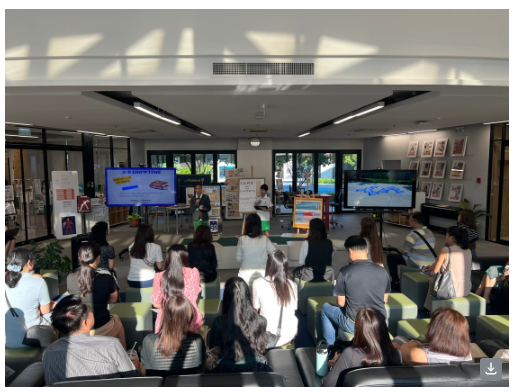
Thank you for joining us last week for the 5-6 ShowTime. We had a great turnout from parents and the learners enjoyed sharing their process and learning with you. In an educational environment like VERSO, which emphasizes comprehensive development, the cultivation of presentation and speaking skills is of paramount importance. This is a very big focus for us to build confidence and become storytellers in their learning process.
These skills are not merely academic tools; they are vital life skills that have profound implications on a learner's personal and professional life. Effective presentation and speaking skills enable learners to communicate their ideas clearly, persuasively, and confidently. This is crucial in a world where the ability to present information in a coherent and engaging manner can significantly impact academic success, career advancement, and leadership opportunities. These skills foster self-confidence and self-expression, allowing learners to articulate their thoughts and opinions effectively in diverse situations.
They empower learners to become global citizens, capable of navigating and contributing to an increasingly interconnected world. In a digital age where communication extends beyond face-to-face interactions, these skills are essential for creating impactful digital content and for effective online communication. Ultimately, proficiency in presentation and speaking equips learners with the tools to be articulate, persuasive, and influential in their future endeavors, whether in academia, their personal lives, or their eventual professional fields.
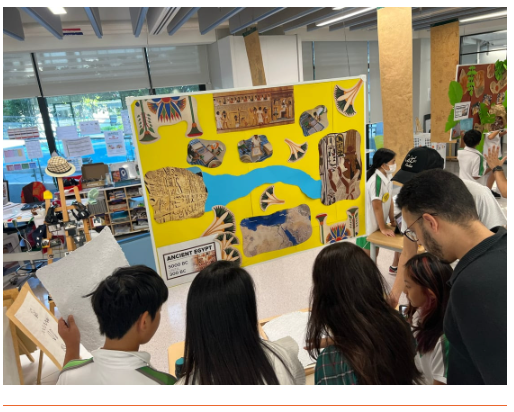
ML Learning Lab Matrix | 4 Year Program

In our Look 4 Learning workshop, we shared with you a 'behind the scenes' look at our planning and documentation that goes into the design and construction of learning labs. The above is a snippet of just one of the ways we capture and connect the 4 main learning lab components. These are:
- Driving Question: The vision for the learning lab of what we want learners to be curious about to make discoveries.
- Subjects that integrate with the learning lab project which defines the context for learning.
- New York State Standards - the outcomes we want learners to come to know and understand to demonstrate knowledge.
- Competencies that provide opportunities for learners to demonstrate what they can do with what they know.
There are of course many other tools, templates, and documents that we use to design meaningful and relevant experiences such as performance tasks, assessment rubrics, and planners.
We just wanted to take this opportunity to share that the next phase of our work is to develop our ML 4 year learning lab program as a matrix with the above key curriculum components so families get a strong sense of the learning experiences their child will have over their 4 years in the ML.
The construction of this takes many interactions as we balance and align our program with all the other labs we offer to ensure exposure and continuity over time. This is exciting work and requires that all Learning Designers be involved in the process of building this program. We will share with you the next phase of this work and present in our next ML workshop/info session. For now, please know that we are on it!
Through the Window I Capturing Projects
The 5-6 cohort have been working on an artistic mural as part of their Q2 Learning Lab. It is still a work in progress, but it is really coming along!
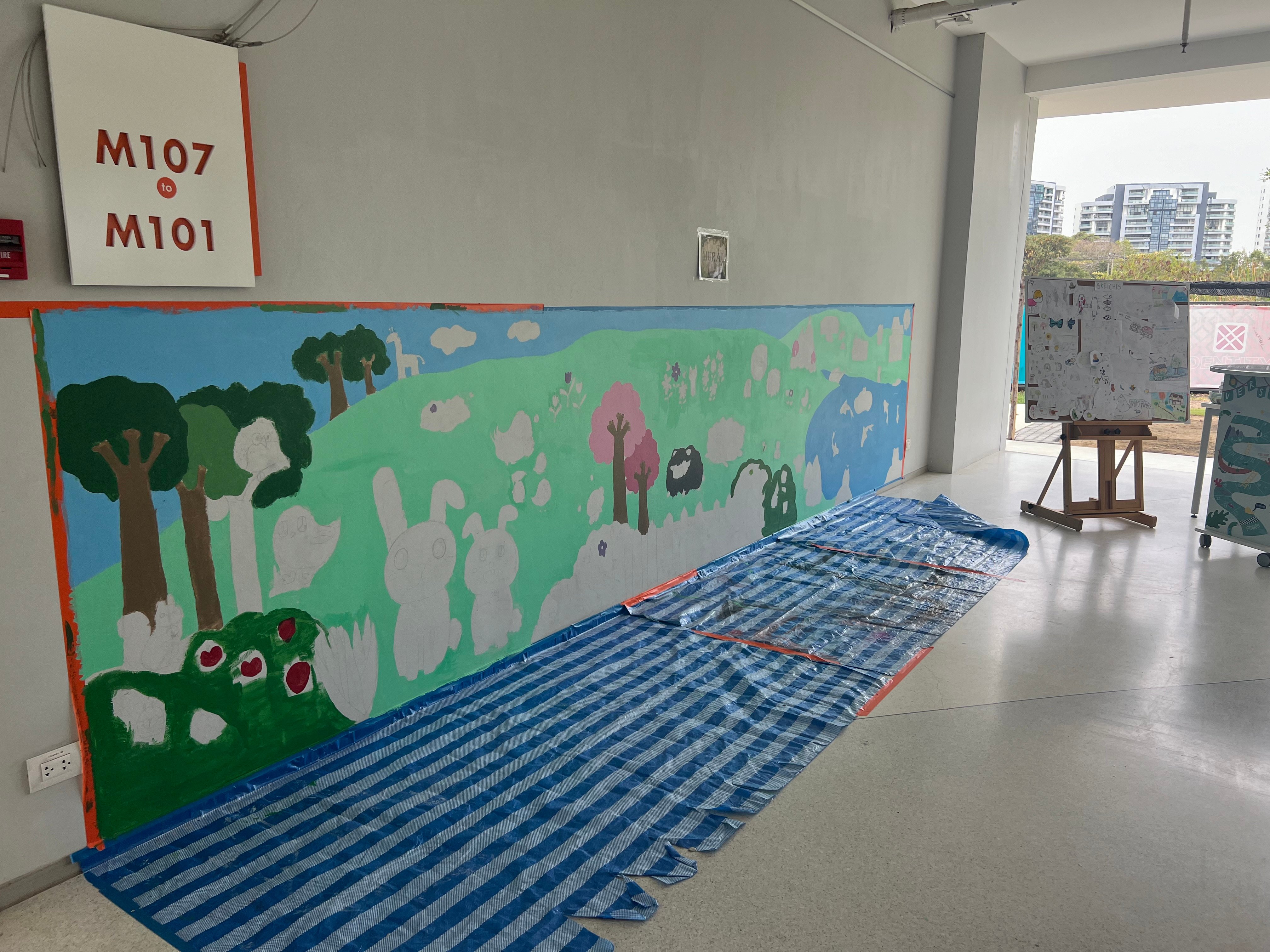
The 7-8 cohort have been designing a sustainable garden at the back of the ML. They have big plans to have a healthy garden with compost and introduce some animals in the future. Watch this space evolve!
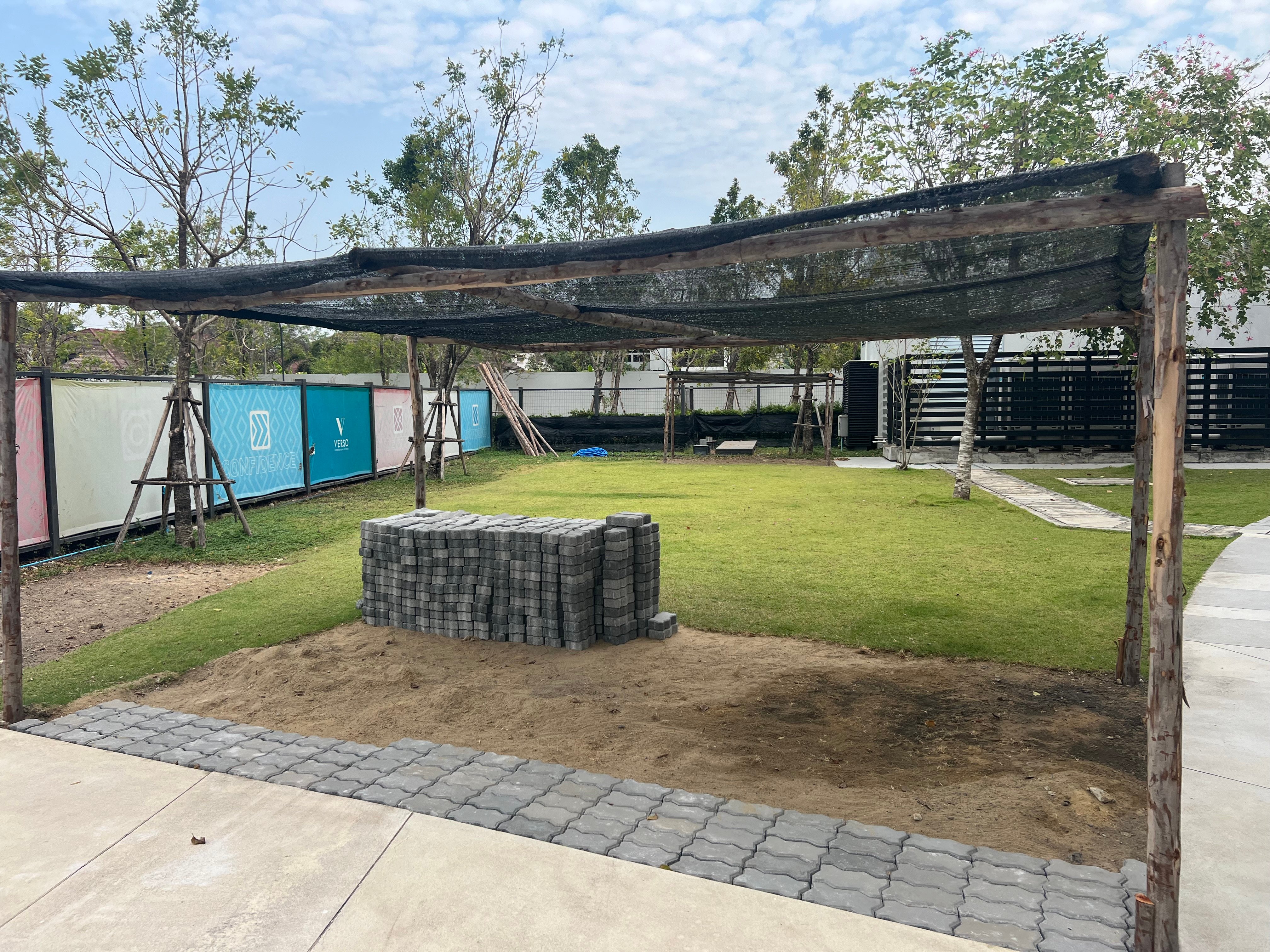
Technology & Safeguarding | Home-School Partnership
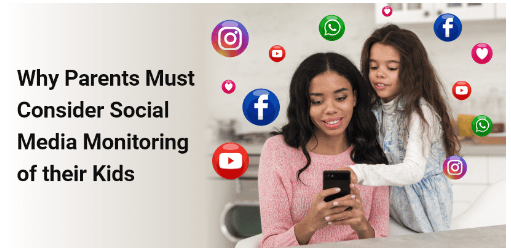
Dr Rolly (Director of Technology and Innovation) runs tech workshops for ML learners every Day F. One of his objectives is to teach learners how to use technology responsibly as a force of good - learning, connecting and communicating. The pressure of social media, being 'liked' and popular is a major driver for teenagers to sometimes use technology inappropriately. With technology being such a big part of society and everyone's lives, we all have a part to play in shaping and guiding teenagers to navigate the pitfalls of social media and inappropriate tech use, not to mention just the amount of time spent on devices that can lead to undesirable outcomes. Banning technology is not the answer, learning to use it properly and designating discipline in the amount of time we are on the devices is our focus.
Teenagers are so quick to learn and often know how to hide things, set a password the parents don't know or clear their history so the parents are locked out.
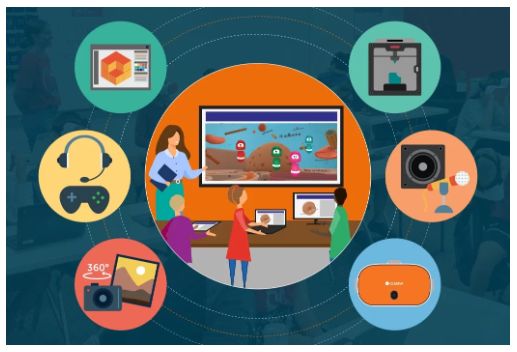
In the context of an international school setting like VERSO, where technology is often an integral part of the learning environment, the role of parents in monitoring and guiding their children's use of digital devices becomes increasingly important. This oversight is crucial in ensuring that technology acts as a force for good, fostering healthy behaviors and learning experiences.
Firstly, parental awareness of their children's digital activities helps in safeguarding against the myriad risks present online, such as exposure to inappropriate content, cyberbullying, and potential predation. By understanding what their children are accessing and who they are interacting with online, parents can take proactive steps to educate them about digital safety and etiquette. This knowledge also allows parents to set appropriate boundaries and screen time limits, which is essential for preventing excessive use that could lead to digital addiction, disrupted sleep patterns, and diminished physical activity.
Moreover, parents who are informed about their children’s digital habits are better positioned to guide them towards constructive and educational online content. This guidance can enhance the learning experience, complementing the school curriculum with additional resources and interactive learning opportunities. Such involvement also fosters a collaborative relationship between parents and children, where technology becomes a shared topic of interest and exploration, rather than a point of contention.
In addition, parental involvement in their children's digital lives helps in instilling responsible digital citizenship from an early age. This involves teaching children about the permanence of their digital footprints, the importance of privacy, and the ethical use of technology. In international schools, where students come from diverse cultural backgrounds, this also includes cultivating an understanding and respect for different cultures and perspectives encountered online.
Lastly, by being aware of their children's online activities, parents can encourage a balanced lifestyle that includes offline activities and face-to-face interactions, which are vital for holistic development. Encouraging children to engage in physical play, socialize in person, and participate in extracurricular activities ensures that technology enhances rather than hinders their social, emotional, and physical well-being.
Parents’ active participation in understanding and monitoring their children's use of technology is paramount in ensuring that it serves as a beneficial tool in their development. It not only protects them from potential harms but also maximizes the educational and developmental benefits that technology can offer, especially in a dynamic and diverse educational environment like an international school.
Below is a US study of how frequently parents check their child's history. The purpose of sharing this graphic is to serve as a prompt for you to reflect on which column represents how often you review your child's history or what they post on social media. Let's all work together and be consistent on teaching our teenagers that we care and we are aware of what they are doing on your device. Remember, the devices they have is something you bought them. It is not their device - it is your device that you allow them to use. Parents have complete control and ownership of how their child uses the device you have provided for your child.
If you have any questions on how to set up parent control/settings on the device you give your child, let us know and we can workshop this at VERSO.
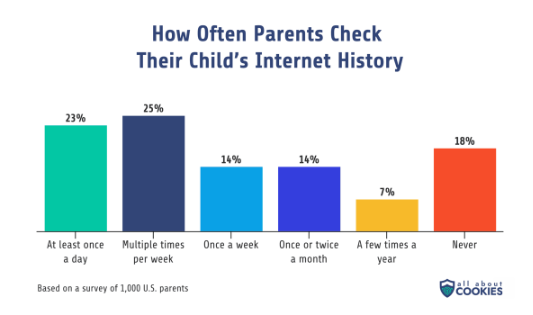
Joshua Jones | Welcome to the ML Team
Joshua Jones will be joining the ML team very soon. We are thrilled Josh is joining the team till the end of the year. Josh has extensive experience and skills in literacy and comes with a lot of IB PYP experience. He will be part of our literacy labs, visual arts, and Explore projects. You may have already seen Josh around the campus either coaching the U11 girl's basketball team earlier this year or in pH7 working on publishing his book as he is a vivid and prolific writer. We know that Josh will fit right in and inspire learners to be prolific writers and enjoy the process or being an author. Can't wait to have Josh on board!
VERSO HACK 2024
Our signature event, VERSO HACK 2024 takes place 3-4 February 2024, with a half day Pre-HACK Day on 27 January 2024.
There is a parent session on 27 January which you are all invited to attend. Please see details below.
I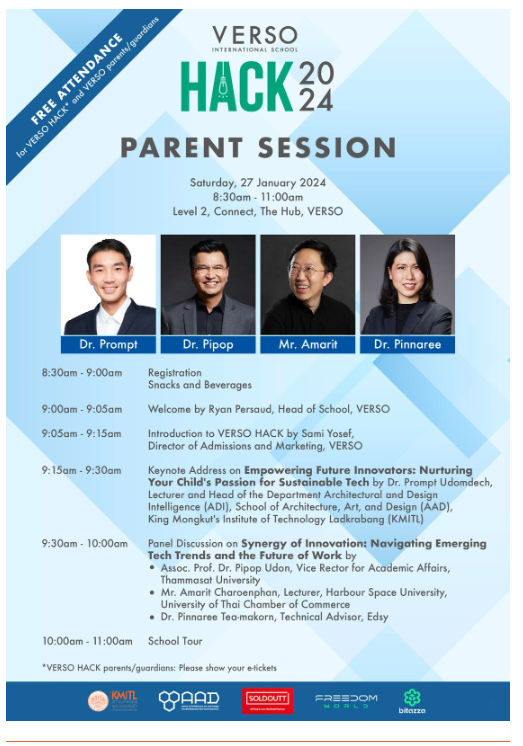
Please also note that effective Mon 29 Jan, the UL-Arena turnstile will be in operation during the following hours: 7:15am-8:15am and 3:00pm-4:30pm.
Hope you enjoyed the ML Muster!
Best regards,
Middle Loop Team
Save The Dates
Save The Dates
- 27 January: Pre-HACK Day
- 31 January: Coffee Morning: "Elevate, Innovate, Educate: Unveiling the Evolution of Our High School Academic Program for 2024-2025" by Greg and J (8:00am-9:00am)
- 2 February: Q2 VERSO 360 go out to families
- 3-4 February: VERSO HACK Days; Final round on 4 Feb,1:30pm is open to public to attend. Please register for your tickets at www.verso.ac.th/hack
- 5 February: Special School Holiday for Hackathon
- 7 February: UniVERSOtea Morning: Applying in Asia
- 9 February: VERSO Lunar New Year Celebrations
Tags: Middle Loop Muster
